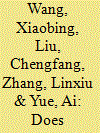|
|
|
Sort Order |
|
|
|
Items / Page
|
|
|
|
|
|
|
| Srl | Item |
| 1 |
ID:
120621


|
|
|
|
|
| Publication |
2013.
|
| Summary/Abstract |
The rapid expansion of enrollment capacity in China's colleges since the late 1990s has come at the price of high tuition hikes. China's government has put forth financial aid programs to enable poor students to access higher education. Although studies have shown that poor high school students are indeed able to attend college when their test scores are high enough (that is, few are unable to attend when they are qualified to attend), the literature has not explored whether poor students have sufficient amounts of aid to thrive in college.
Using findings from a randomized controlled trial, this study evaluates the impact of providing full scholarships to students from poor rural areas (henceforth treatment students) on student stress levels, self-esteem/self-efficacy, and participation in activities in four first-tier colleges. To do so, we compare outcomes of the treatment students with students who were not given full scholarships by the project (and were left to search for scholarships and other sources of financial aid from the university system itself-the control students). The project was run among the 200 poorest first-year students in four first-tier colleges in inland China. Somewhat surprisingly, we find that treatment students (those receiving full scholarships from the project) were only slightly more successful in obtaining financial aid than control students. This suggests that control students (those who did not receive full scholarships from the project) were still able to access comparable levels of financial aid. Most importantly, scholarship recipients were statistically identical in outcome to control students in terms of stress, self-esteem, and participation in college activities, suggesting that poor students (who are dependent on aid from the university system) currently are able to access sufficient levels of financial aid, are able to take advantage of the activities offered at college, and do not shoulder heavy financial or psychological costs.
We find, therefore, that efforts of the government to alleviate the financial burden of college on the poor have been relatively successful in first-tier colleges. Because of this, foundations and individuals may decide that if they want to improve human welfare, giving additional scholarships at high tier colleges may be having little effect.
|
|
|
|
|
|
|
|
|
|
|
|
|
|
|
|
| 2 |
ID:
119193


|
|
|
|
|
| Publication |
2013.
|
| Summary/Abstract |
Officials in China claim that voting rates in rural village elections are high. However, the true voting rate is lower, especially for women. We postulate that women are less likely to vote owing to insufficient knowledge about their rights. The objective of this paper is to test whether the knowledge levels of women and village leaders about women's voting rights can affect women's voting behaviour. We report on the results of a randomized controlled trial (RCT) involving 700 women in China's Fujian and Liaoning provinces. Villages were randomly assigned to either a control group or one of three intervention groups. One intervention provided voting training to women only, another provided training to both women and village leaders, and the third provided training to village leaders only. After women received training, their scores on a test of voting knowledge increased, and they more fully exercised their voting rights. When only village leaders were trained, test scores and voting behaviour were not statistically different from the control villages.
|
|
|
|
|
|
|
|
|
|
|
|
|
|
|
|
|
|
|
|
|